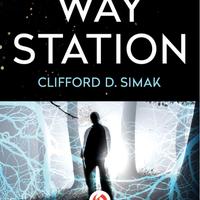Chapter Two (2)
“Then Enoch came home from the war and they farmed the place together for a year or so. The old man bought a mower—one of those horse-drawn contraptions with a sickle bar to cut hay or grain. It was the progressive thing to do. It beat a scythe all hollow.
“Then one afternoon the old man went out to mow a hayfield. The horses ran away. Something must have scared them. Enoch's father was thrown off the seat and forward, in front of the sickle bar. It was not a pretty way to die.”
Hardwicke made a grimace of distaste. “Horrible,” he said.
“Enoch went out and gathered up his father and got the body to the house. Then he took a gun and went hunting for the horses. He found them down in the corner of the pasture and he shot the two of them and he left them. I mean exactly that. For years their skeletons lay there in the pasture, where he'd killed them, still hitched to the mower until the harness rotted.
“Then he went back to the house and laid his father out. He washed him and he dressed him in the good black suit and laid him on a board, then went out to the barn and carpentered a coffin. And after that, he dug a grave beside his mother's grave. He finished it by lantern light, then went back to the house and sat up with his father. When morning came, he went to tell the nearest neighbor and that neighbor notified the others and someone went to get a preacher. Late in the afternoon they had the funeral, and Enoch went back to the house. He has lived there ever since, but he never farmed the land. Except the garden, that is.”
“You told me these people wouldn't talk to strangers. You seem to have learned a lot.”
“It took two years to do it. I infiltrated them. I bought a beat-up car and drifted into Millville and I let it out that I was a ginseng hunter.”
“A what?”
“A ginseng hunter. Ginseng is a plant.”
“Yes, I know. But there's been no market for it for years.”
“A small market and an occasional one. Exporters will take on some of it. But I hunted other medicinal plants as well and pretended an extensive knowledge of them and their use. ‘Pretended' isn't actually the word; I boned up plenty on them.”
“The kind of simple soul,” said Hardwicke, “those folks could understand. A sort of cultural throwback. And inoffensive, too. Perhaps not quite right in the head.”
Lewis nodded. “It worked even better than I thought. I just wandered around and people talked to me. I even found some ginseng. There was one family in particular—the Fisher family. They live down in the river bottoms below the Wallace farm, which sits on the ridge above the bluffs. They've lived there almost as long as the Wallace family, but a different stripe entirely. The Fishers are a coon-hunting, catfishing, moonshine-cooking tribe. They found a kindred spirit in me. I was just as shiftless and no-account as they were. I helped them with their moonshine, both in the making and the drinking and once in a while the peddling. I went fishing with them and hunting with them and I sat around and talked and they showed me a place or two where I might find some ginseng—‘sang' is what they call it. I imagine a social scientist might find a gold mine in the Fishers. There is one girl—a deaf-mute, but a pretty thing, and she can charm off warts …”
“I recognize the type,” said Hardwicke. “I was born and raised in the southern mountains.”
“They were the ones who told me about the team and mower. So one day I went up in that corner of the Wallace pasture and did some digging. I found a horse's skull and some other bones.”
“But no way of knowing if it was one of the Wallace horses.”
“Perhaps not,” said Lewis. “But I found part of the mower as well. Not much left of it, but enough to identify.”
“Let's get back to the history,” suggested Hardwicke. “After the father's death, Enoch stayed on at the farm. He never left it?”
Lewis shook his head. “He lives in the same house. Not a thing's been changed. And the house apparently has aged no more than the man.”
“You've been in the house?”
“Not in it. At it. I will tell you how it was.”

